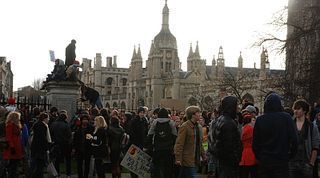Student occupation: the dilemmas

OK -- as the editor and others have pointed out following my last post, having an awful lot of teaching to do is not much of an excuse for failing to get my hands dirty down at the occupation at the Old Schools. ("Where were you when the revolution needed you Beard...?" "Teaching, Sir...")
But that is just one of the paradoxes of this kind of political action.
I mean, if the students are protesting (in part) in order to save the study of Arts and Humanities from the forces of darkness, then there would have been something self destructive in giving up the teaching of said subjects, just to join in at the Senate House.
And especially this week, when I was seeing all the third years for whom I Direct Studies, one by one, as well as checking in with those whose undergraduate theses I am supervising, squeezing in the last essay supervision of the term with everyone else, and making sure that the MPhils got their first assessed essays in in time ... etc etc . (If you ever hear any Mum or Dad complain that their kid is not getting the hands-on treatment at Uni that they expected -- dont believe it; at least not for Classics in Cambridge.)
Anyway, this all coincided with the longlisting meeting for our college junior research fellowship competition -- which meant reading carefully through 218 applications to pick out fewer than 20 to go to the next stage (in the end we have only one position to give). You can do the calculations for yourself. Just imagine I took the bare minimum of 10 minutes per application (and that would have been a cracking pace) -- it would have taken 36 hours solid... Which indeed it did, and more.
But there are other strange anomalies. And the biggest of those is the very nature of the law breaking and transgression that the occupation implies.
Let me repeat that, politically, I am absolutely on the side of the students; they are standing up for a load of principles in which I believe. And I hope that the University lets them off very lightly indeed, and gets down to talk to them about the issues and dilemmas we are facing. For the students are our greatest allies.(They have a General Assembly on Sunday at 1.00, open to all, to discuss the next step.)
But, all the same, there is something illogical in thinking (as some of my colleagues seem to do) that any threat of punishment or legal action is merely an example of the oppressive and vindictive power of establishment authority being wreaked on the innocent.
After all the students are occupying a place in contravention of custom, rule and law. That's the whole point. You cant "occupy" somewhere (like a JCR, or Students' Union) where you are allowed to be anyway. It HAS to be transgressive; and so it has to attract the attention (yes, and even the threats) of the authorities and the police, who in their turn have to make it clear that transgression is taking place. Otherwise it's more like a sleepover than a protest.
There is, in other words, a symbiosis here between action and reaction, protest and punishment, that goes unnoticed in many of the cries of anguish we are now hearing about the authorities' tough line.
It reminds me of when my son, a sixthformer, bunked off school to march against the Iraq war. I was dead proud of him. Then the school rang to say that he had been absent without leave.
Yes, I said, and I hope that you will be punishing him. No, came the reply, he is very sincere.
Sincere or not, I thought, there was a lesson to be learned here. If you want to protest, that's fine, but you have to feel the pinch -- otherwise it's too risk-free, and you are being smothered in well-meaning paternalism ("Off you go and march now/occupy the Old Schools...just so long as you are 'sincere'")
In my son's case, I would have had him do 500 lines: "Mr Blair is wrong to go to war on Iraq" 500 times over would, I think, have been an appropriate punishment in the circumstances.
For our students, I would pat them on the back, give them a very big cheer and a party -- then I would have them give 20 hours to a telephone campaign raising money for Arts and Humanities, or writing begging letters to old boys and girls explaining why they had occupied the Old Schools, why it was important to them, and why a bit of cash would help.
It's called making the "punishment" fit the "crime"
Mary Beard's Blog
- Mary Beard's profile
- 4070 followers



